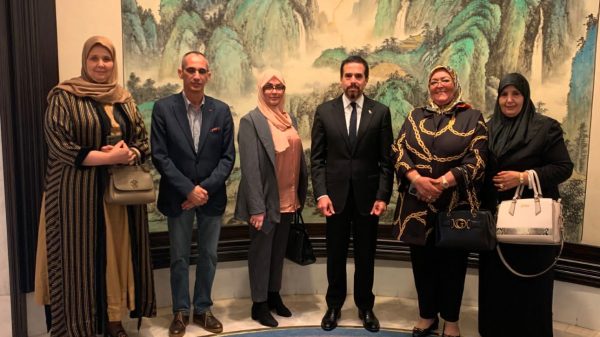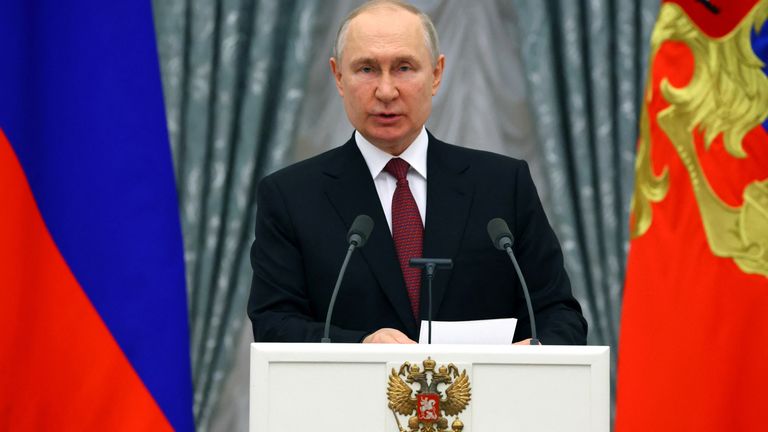What are the biggest threats to our way-of-life?
This question was the underlying concern at the London Defence Conference, which took place this week. The prime minister and chief of the defence staff were in attendance along with politicians and academics from all over the Western world.
The immediate crisis is Ukraine.
The general consensus was that victory was essential, not only for Ukraine but for its allies’ continued security. George Robertson warned, in the margins of this conference, that the rules-based system will collapse if Russia’s illegal invasion and violence is not stopped.
If Putin is able to invade a sovereign neighbor, autocrats in Africa, Latin America, and elsewhere may feel freer to grab land and rewrite borders.
CDS Admiral Tony Radakin insisted that NATO should do all it can to help Ukraine’s military forces. The UK aims to train more than 20,000 Ukrainian soldiers this year. He said that Western politicians “should not be afraid of an escalation”.
Time is of the essence. Many were afraid that support for Ukraine could quickly fracture if Donald Trump or another Trumpist Republican was elected as the US president in November 2024. Ben Hodges, a retired US Army General, was confident the bipartisan support of Republicans and Democrats would survive that.
The Ukraine is changing the balance of global power.
The most significant NATO strength is the fact that Finland and Sweden, which were previously neutral countries, have joined. Russia, and China, have retreated from each other, while “middle-power” rising powers in India and Africa, as well as Latin America, have refused to choose sides and have essentially rewarded Putin’s goals.
What challenges await Ukraine after its liberation as a nation-state? What challenges lie ahead, beyond the liberation of Ukraine as a free nation state that is so desperately needed?
They included a wide range of suggestions: conflict with Russia or China over Taiwan, the Arctic and Iran; nuclear weapons and Chinese expansionism; and an opposite economic slowdown in China. Other ideas included fragmentation and disruption of global communication and supply chains; climate change and competition for hydrocarbons and rare earth metals that are essential to digital communications and renewable energies; and societal breakdown caused by rising economic pressures.
The surprising consensus was that, despite the massive damage Russia has caused, Putin’s regime miscalculated. It is now a dependent of China. The Russian rebuff to China’s invasion of Taiwan has been removed by the Russian rebuff.
Russia’s strength lies in its role of oil and gas provider. Now, it has joined Saudi Arabia as a member of OPEC+. China also mediated a cautious reconciliation with another hydrocarbon producer, Iran. These suppliers are looking for new customers as Europe moves away from Russian energy. They also want to expand their influence around the world.
Helen Thompson, a professor of political sciences at Cambridge University, suggested that a cartel of countries that possess rare earth metals, which are essential for new technologies, could form. She said that even if we were to succeed in decarbonising, our dependence on foreign metals would be enormous.
She also pointed out that despite the efforts of Saudi Arabia, its allies and the US government to prevent the US from becoming the largest producer of oil and natural gas in the world, they were unable to do so. The world has become more multipolar and competitive, but thanks to the US’s natural resources, technology lead and strength in its economy, it is likely that the US will remain dominant.
China’s economy grows slower as its population ages. Western leaders must be alert as China tries to use existing global institutions like the UN for its own benefit. However, Professor Thomson says that unlike Russia, China wants to destroy the rules-based order of the world established after World War II.
Since the launch chatGPT the political leaders are concerned about the “existential threat” posed by AI.
Sam Altman, chief executive of Open AI, which developed Chat GPT was summoned by the US Congress to testify. He attended a meeting this week with Rishi Sunak and other tech leaders to discuss how AI can be moderated to prevent catastrophes.
As far as cooperation is concerned, it appears to be working. Tech innovators like Elon Musk have voiced their concerns with legislators.
Henry Kissinger, the Nobel Peace Prize winner, has focused on AI’s potential effects. Many consider Mr Kissinger to be a foreign policy expert. He was Secretary of State for President Nixon in the 1970s.
In interviews to celebrate his 100th Birthday this weekend, he warned: “The pace at which artificial intelligence will act in crisis situations is problematic.” In a series of interviews to mark his 100th birthday this weekend, he warned: “The speed with which artificial intelligence acts will make it problematical in crisis situations… In the past arms races you could come up with plausible theories on how to win. It’s an entirely new intellectual problem …”
His comment helps explain why AI wasn’t discussed as a significant risk by my panel. AI and quantum computing are expected to be extremely powerful tools, but they will be regulated and controlled by humans. They are not autonomous. We are responsible for getting it right.
A self-deprecating, “I wouldn’t say that would I?” was used by Polly Scully. Polly Scully said that the processing of data could be a valuable asset for citizens, as it would allow them to better analyze threats and better prepare themselves.
She was a British civil service employee who worked on crisis mitigation. Palantir is the Big Data analytics firm co-founded with Peter Thiel, an important Silicon Valley investor.
Panelists, including Francesca Ghiretti of the University of Oslo and Francesca Ghiretti, an expert on China, agreed that the greatest threat to communication and electricity supply was the cutting of cables under the sea.
I am more optimistic after hearing about the risks discussed at the London Defence Conference.
Subscribe to Ukraine War Diaries wherever podcasts are available
Ukraine is not yet out of the crisis and will need to make sacrifices for many years. CDS Radakin, however, said that Western forces “have nothing to learn from how Russia fights”, but are adapting and modernising themselves rapidly because of the experience they have gained in the conflict.
He believes that Vladimir Putin has no incentive to deploy nuclear weapons, as they would have no military purpose and would trigger an overwhelming NATO response.
There are major threats and challenges on the horizon. We are not doing enough to combat climate change globally. The “Western” democratic countries are losing ground to other nations with different ideologies. Western political institutions have suffered recently due to poor leadership and self-indulgence.
It will take a lot of work to win hearts and minds all over the world. If we work together, we have the human, material and technological resources to defeat the risks we see in front.






















